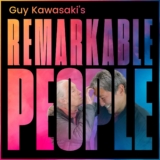This week on Remarkable People, we’re exploring the world of Stacey Abrams, a relentless advocate for democracy. Dive into her inspiring story of ...
Explore the art of argumentation and persuasion with Mehdi Hasan in the latest episode of the Remarkable People podcast. Tune in for an enlightening ...
Join Gretchen Rubin, author of The Happiness Project, as she reveals the secrets to optimizing your senses and unlocking your true potential. 🌟 Listen now to ...
Ever wondered how a remarkable employee experience can transform your business? Join us in our latest episode of the Remarkable People podcast as we delve into ...
In this candid conversation, high school English teacher Kelly Gibson shares her experiences and insights on dealing with everyday challenges and pressures in ...
Discover the fascinating world of incentives and their impact on human behavior, innovation, and ethical considerations with Uri Gneezy and Guy Kawasaki on the ...
Are you struggling to find a balance between your work and personal life? Tune in to the Remarkable People podcast with Tina Wells, a renowned business ...
Are you looking for innovative strategies for achieving growth without displacement? Look no further than our latest podcast episode featuring Renée Mauborgne, ...
In this episode, Rebecca Rolland and Guy Kawasaki, host of the Remarkable People podcast, discuss the importance of having meaningful conversations with ...
In this episode of the Remarkable People podcast, David Ambroz shares his incredible story of resilience and perseverance in the face of homelessness and ...
Have you ever thought about how language shapes our world? Linguistics expert Valerie Fridland breaks down the complexities of language and reveals how it ...
Helping me in this episode is the remarkable Christina Maslach. You will not find anyone more knowledgeable on burnout than her.If you don’t believe me, ...
Welcome to Remarkable People, where we bring you conversations with the world’s most accomplished and influential individuals. Today, we are honored to ...
Join Guy Kawasaki on the Remarkable People podcast as he interviews Wanda Harding, a former NASA engineer turned 8th-grade teacher and author. Get inspired by ...
Empower yourself and others. Listen to Latanya Mapp Frett’s insights on feminism and technology on Remarkable People Podcast. 00:20 to 02:11- Intro18:11 ...
In this episode of the Remarkable People podcast, Guy Kawasaki interviews Ginni Rometty, former CEO of IBM, to discuss her experiences and insights on ...
How can we improve our communication skills and speak more intently in an endlessly noisy world? Join the conversation on the latest episode of Remarkable ...
Discover how our stone-age brains still influence our behavior today with Douglas Kenrick & David Lundberg-Kenrick on Guy Kawasaki’s Remarkable ...
At Remarkable People, we believe in shining a light on those making a difference in their communities and the world. That’s why we’re thrilled to ...
Steve Case (founder of AOL and author of The Rise of the Rest: How Entrepreneurs in Surprising Places are Building the New American Dream) is on Guy ...
- « Previous Page
- 1
- …
- 6
- 7
- 8
- 9
- 10
- …
- 17
- Next Page »

